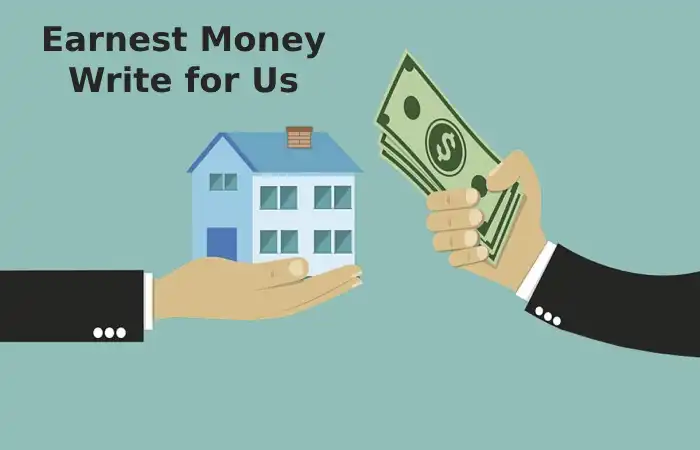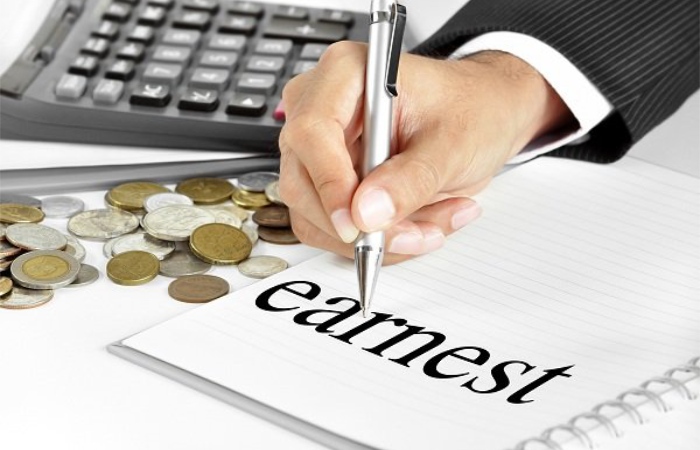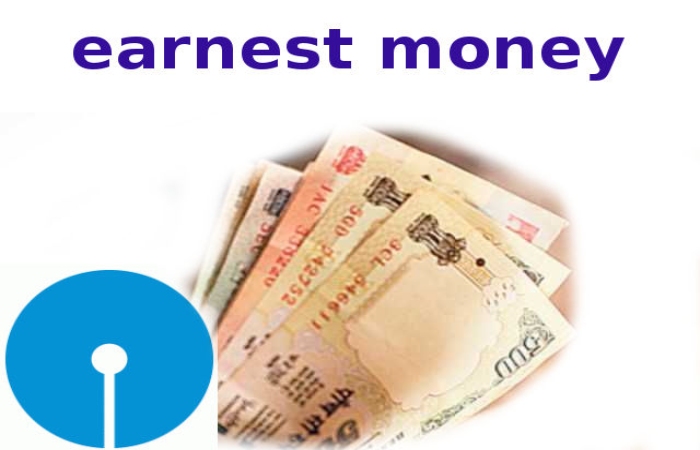 Earnest Money Write for Us, Earnest money is put down before closing on a house to show you’re serious about buying. It’s also known as a good faith credit. When a buyer and seller enter into an acquisition contract, the seller takes the home off the market while the deal moves through the entire course to the final. If the agreement fails, the seller has to relist the house and start over again, which could result in a big financial hit.
Earnest Money Write for Us, Earnest money is put down before closing on a house to show you’re serious about buying. It’s also known as a good faith credit. When a buyer and seller enter into an acquisition contract, the seller takes the home off the market while the deal moves through the entire course to the final. If the agreement fails, the seller has to relist the house and start over again, which could result in a big financial hit.

Earnest money protects the seller if the buyer backs out. It’s typically around 1 – 3% of the sale price and is held in an escrow account until the deal is complete. The exact amount depends on what’s normal in your market. If everything goes smoothly, the earnest money applies to the buyer’s down payment or closing costs.
Importance of Earnest Money
In most suitcases, sellers will ask for a good-faith deposit. It safeguards the interests of the seller and the buyer. It shows the seller you’re serious about buying the home, which can be reassuring to them if they agree to take the house off of the market while awaiting the appraisal and inspection results,
A considerable deposit can compel the seller to select your offer over others when buying a property with high demand. You may also get more favorable contract terms. Parties in a home sale can agree to apply earnest money to the buyer’s down payment or closing costs. In such a case, you’re putting up some amount for the home in advance.
What is the Meaning of Earnest Money?
Earnest money refers to the deposit paid by a buyer to a seller, reflecting the buyer’s good faith in purchasing a home. The cash buys more time for the buyer before closing the deal to arrange for funding and perform the hunt for names, property valuation, and inspections. In many respects, earnest money can be called a deposit on a property, an escrow deposit, or cash of goodwill.
What to do to Protect Your Earnest Money Deposit?
Prospective buyers can do various things to secure their earnest money deposits. Make sure the contract provides possibilities for funding and inspections. Without these, the deposit will be forfeited if, during the review, the buyer can’t get funding or a significant defect is found.
Read, comprehend, and comply with the terms and conditions of the contract. For instance, if the contract specifies that a home inspection needs to be done by a certain date, the buyer must meet the deadline, or they risk losing the deposit and the property.
Ensure that the deposit is handled properly. The deposit must be payable to an apparent third party, such as a well-known real estate brokerage, title company, escrow, or law firm. Buyers can keep the funds in an escrow account and receive a receipt.
Why Should You Pay Earnest Money?
Earnest money isn’t always a requirement, but it could be necessary if you’re shopping in a competitive real estate market. Sellers favor these good-faith deposits to ensure the sale won’t fall through. Earnest money can act as added insurance for both parties in the transaction.
Earnest money could also lower the amount you need at closing because it’s useful for your own sum or closing costs. Essentially, you’re just putting up some money earlier in the process.
How Verified Approval Could Help
Rocket Mortgage’s Verified Approval can give you even more of a leg up on the competition by assuring the seller that you can qualify for the loan you need. A seller looking at multiple offers is more likely to lean toward a buyer with approved funding – and having earnest money down on top of it can make your request stand out even more.
How Much Earnest Money Is Sufficient?
The amount of serious money you should offer depends on the exact real estate market your favorite property is in. A languishing real estate listing in a slow market may not need as much earnest money as in a hot market with multiple buyers vying for the same property. If you plan to buy in a neighborhood where cash offers and bidding wars are joint, a higher good-faith deposit is a good idea.
Is Earnest Money Refundable?
Earnest money has contingencies that protect the seller and buyer in certain situations.
When you offer, a home and the seller accepts, the sale only finalizes when contingencies, or certain criteria, are met. They typically list in the purchase agreement and cover the inspection, appraisal, and mortgage approval, among other items.
Home Inspection Contingency
The home inspection is a common reason buyers back away from a deal. If a professional inspects your prospective home and some elements need repair, a home inspection contingency can allow you to back out of the transaction. If you don’t want to back out of the deal, you could also work with the seller to make the repairs or have them lower the purchase price so you can do the repairs yourself.
Appraisal Contingency
The appraisal contingency, which protects the buyer if the property overvalues, is equally important. The lender hires a third-party appraiser to determine the home’s fair market value and compare it to similar properties for sale. With this contingency, if the house appraises at less than the sale price, you can select not to move forward with the deal and get your serious money back. Otherwise, you can use the appraisal to negotiate a new price
How to Submit Your Articles
To Write to Us, you can email us at contact@thewhoblog.com
Why Write for The Who Blog – Earnest Money Write for Us
 Writing for Thewhoblog can give massive exposure to your website for customers looking for Earnest Money. Thewhoblog presence is on Social media and will share your article for the Earnest Money related audience.You can reach out to Earnest Money enthusiasts.
Writing for Thewhoblog can give massive exposure to your website for customers looking for Earnest Money. Thewhoblog presence is on Social media and will share your article for the Earnest Money related audience.You can reach out to Earnest Money enthusiasts.
Search Related Terms to Earnest Money Write for Us
- earnest money
- earnest money deposit
- what is earnest money
- earnest money definition
- what is earnest money in real estate
is earnest money refundable - earnest money real estate
- what is earnest money real estate
- real estate earnest money
- what happens to earnest money at closing
- earnest money in real estate
- earnest money meaning
- how much is earnest money
does earnest money go towards a down payment - what is an earnest money deposit
Article Guidelines on Thewhoblog – Earnest Money Guest Post
We at Thewhoblog welcomes fresh and unique content related to Earnest Money. Thewhoblog allow a minimum of 500+ words related to Earnest Money.
For publishing article at Thewhoblog email us at Contact@thewhoblog.com


